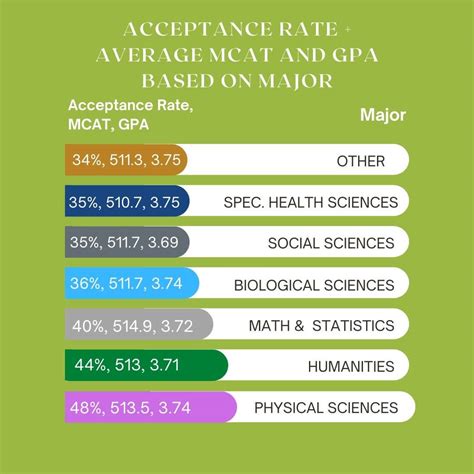Aspiring medical professionals face a crucial decision in selecting the optimal undergraduate major to prepare them for the rigors of medical school. This article delves into the myriad of pre-med majors, their respective strengths, and the factors to consider when making this pivotal choice.

Defining the Ideal Pre-Med Major
The ideal pre-med major should provide a solid foundation in the sciences necessary for medical school, including biology, chemistry, and physics. It should also foster critical thinking, problem-solving, and communication skills essential for success in the healthcare field. Additionally, it should align with the student’s interests and career goals.
Top Pre-Med Majors
Biology
Average MCAT Score: 510.5
Biology is the most popular pre-med major, offering a comprehensive understanding of living organisms and biological processes. It provides a strong foundation in anatomy, physiology, genetics, and other core medical sciences.
Chemistry
Average MCAT Score: 513.7
Chemistry is another highly competitive pre-med major, focusing on the composition, properties, and interactions of matter. It emphasizes chemical reactions, organic chemistry, and biochemistry, preparing students for medical applications such as drug development and pharmacology.
Physics
Average MCAT Score: 510.1
Physics explores the fundamental laws and principles governing the universe. It develops analytical and quantitative reasoning skills, which are invaluable in medical diagnostics and treatment planning. Additionally, physics knowledge is crucial for medical imaging technologies like MRI and ultrasound.
Biochemistry
Average MCAT Score: 512.3
Biochemistry combines elements of biology and chemistry to study the chemical reactions and processes that occur in living organisms. It provides a comprehensive understanding of metabolism, enzyme mechanisms, and molecular biology, which are essential for understanding medical conditions and developing new therapies.
Physiology
Average MCAT Score: 510.2
Physiology focuses on the function and regulation of living organisms, from the cellular to the whole-organism level. It covers systems such as the cardiovascular, respiratory, and nervous systems, providing insights into the normal and abnormal functioning of the human body.
Factors to Consider
Interests and Career Goals
Choose a major that aligns with your scientific interests and career aspirations. If you envision a career in research, a major with a strong research component may be suitable.
MCAT Performance
Consider the average MCAT scores of different majors to gauge their difficulty and potential impact on your medical school application. However, keep in mind that MCAT performance is influenced by individual factors and preparation.
Course Requirements
Ensure that the major you select fulfills the course requirements for medical schools you plan to apply to. These typically include courses in biology, chemistry, physics, and mathematics.
Extracurricular Activities
Complement your coursework with extracurricular activities that demonstrate your commitment to medicine, such as volunteering in clinical settings, conducting research, or participating in pre-health organizations.
Table 1: Average MCAT Scores by Pre-Med Major
| Major | Average MCAT Score |
|---|---|
| Biology | 510.5 |
| Chemistry | 513.7 |
| Physics | 510.1 |
| Biochemistry | 512.3 |
| Physiology | 510.2 |
Tips and Tricks
- Consult with a Pre-Health Advisor: Seek guidance from a pre-health advisor at your institution to explore your options and develop an individualized plan.
- Research Medical Schools: Familiarize yourself with the course requirements and admissions profiles of your target medical schools to ensure your major aligns with their expectations.
- Excel in Your Courses: Maintain a high GPA in your science coursework as it is heavily weighted in medical school applications.
- Engage in Meaningful Extracurriculars: Participate in activities that demonstrate your passion for medicine and show your commitment to helping others.
- Explore Internships and Research: Gain practical experience in clinical or research settings to enhance your medical knowledge and skills.
Table 2: Pros and Cons of Different Pre-Med Majors
| Major | Pros | Cons |
|---|---|---|
| Biology | Strong foundation in biology; versatile career options | High workload; focus on basic science |
| Chemistry | Excellent preparation for MCAT; versatile career options | Can be challenging for students without a strong math background |
| Physics | Develops analytical and quantitative reasoning skills; opens doors to engineering and technology | May require more time to complete than other majors |
| Biochemistry | Combines biology and chemistry to provide a comprehensive understanding of medical processes | Limited career options outside of healthcare |
| Physiology | Provides insights into human body function; prepares students for advanced medical coursework | More specialized than other majors; may require additional coursework |
Table 3: Useful Strategies for Pre-Med Success
| Strategy | Description |
|---|---|
| Active Learning | Engage in hands-on experiences, group projects, and discussions to improve comprehension. |
| Time Management | Create a schedule and stick to it, allocating time for studying, coursework, and extracurriculars. |
| Note-Taking and Active Recall | Take effective notes and use techniques like spaced repetition to enhance memory. |
| Study Groups | Collaborate with peers to share knowledge, clarify concepts, and prepare for exams. |
Table 4: Common Application Requirements for Medical School
| Requirement | Average Requirement |
|---|---|
| Undergraduate GPA | 3.7-4.0 |
| MCAT Score | 510-515 |
| Interview Performance | Strong communication skills, empathy, and critical thinking |
| Clinical Experience | 100+ hours of volunteer or shadowing |
| Research Experience | 1-2 years of research in a relevant field |
| Letters of Recommendation | 3-5 letters from professors, advisors, and clinical supervisors |
